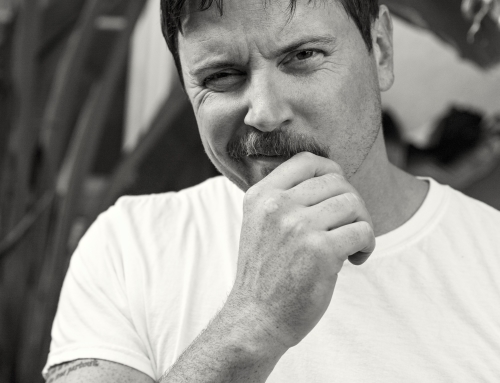Each year Sundance Film Festival pulls in hundreds of official films — indies and shorts — from around the world. For ten thrilling days, the small ski-resort town of Park City, Utah (situated high in the mountains near Salt Lake City) is transformed into a pop-up film festival, notably minus the typical red carpet gush — heels aren’t exactly a good match with the climate here in January.
The festival season opener, Sundance arguably showcases the most experimental and independently spirited films of the year. The festival’s selection of films, is known to send a ripple through the industry — one that influences film trends for the following year to come.
Still buzzing from this year’s jaunt to Park City, we’ve gathered up some of our favourites from the festival to share with you — we’d wager this bunch is headed to the top.
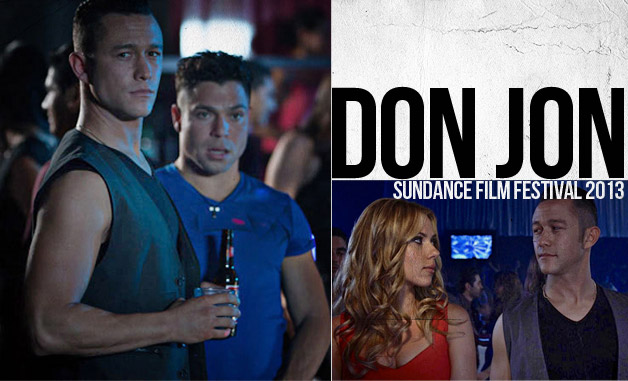
Interestingly, there were more than a few films dealing with pornography at Sundance this year, there was the documentary Kink, produced by James Franco, which goes behind the scenes with the worlds leading producer of BDSM porn, and there was also Rob Epstein’s Lovelace, about the eponymous porn star. Bunched amongst those envelope-pushers, Don Jon’s Addiction was a standout.
Why you want to see it: Don Jon’s Addiction really reached beyond the R-rating in its determination to deliver audiences an unconventional romantic comedy played by an all-star cast and heaped with intelligent and touching scenes. The first feature by Joseph Gordon-Levitt (500 Days of Summer), the young actor also wrote and stars in this labor of love.
Not yet released, the film is tied up in negotiations over the R-rating it is hoping to land. “It actually feels like you are seeing more than you are, but they are carefully edited porn clips that we used in the film,” explains the director. “Technically it is nothing you don’t see in an R-rated film.”
Strategic editing of porn scenes aside, this film is a touching tale, tracing the journey of a present-day, porn-addicted Don Juan-type as he attempts to evolve from the only reality he’s ever known. The film skillfully and thoughtfully tells the story of finding love in the modern age through sharing the story of its male and female characters’ perception of love and sex in a generation of easy access porn online and impractical Hollywood films.
“I wanted to tell a story about love and how people objectify each other. Guys do it to girls, girls to guys. We learn it from all different places. Guys learn from unlimited pornography on the internet. And girls learn it from Hollywood. And neither of these places have our best interest,” says Gordon-Levitt. “I find it hilarious, so I thought it would make a great romantic comedy.”
As audiences will catch, the plot in Don Jon’s Addiction references reality TV show The Jersey Shore with subtle comedic brilliance. The film opens with a team of guys in a club looking for ladies, each one a testament to their values i.e. gym good, hyper-materialism good. A great opening scene, anyone who has seen Scarlett Johansson (Lost in Translation) sell chandeliers on SNL, will especially appreciate her take on New Jersey “ghetto fab.” A film about perception and cultural mores, Gordon-Levitt’s film is proof that the actor/director has his finger on the pulse of the Zeitgeist. “I’m fascinated how people connect to each other. Sometimes I feel objectified. Some people, with nothing to do with show biz, feel the same way, it’s a pretty universal concept.” explains Gordon-Levitt. “ Being a director is cool. It’s great to branch out.” The actor/director admits to consulting Looper’s Rian Johnson, as well as the veteran actors cast in the film for input.
Whoever Gordon-Levitt spoke to, and whatever pop culture phenomenons he researched, the end product is an engaging, insightful and light-hearted film that speaks to a view on love our generation knows first hand.
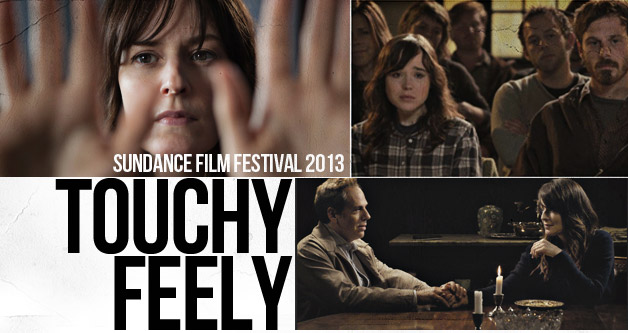
The latest film from cult favourite Lynn Shelton (Your Sister’s Sister), Touchy Feely features an ensemble cast film playing out multiple story times that deal with personal comfort and helping others. The main plot follow actress Rosemarie Dewitt (The Odd Life of Timothy Green) in her role as a massage therapist character, unable to do her job when stricken with a sudden aversion to bodily contact. At the same time, her uptight brother played by Josh Pais (Leaves of Grass) finds himself with a healing touch that draws crowds to his dental practice.
Why you’ll want to see it: Show your national love. This is one of two films that premiered at Sundance with Canadian powerhouse Ellen Page (Juno) starring, the other being The East.
Page plays Pais’ daughter, caught in a rut when she is afraid to move from the caretaker role she has taken on in their lives with the absence of her mother.
“Her character is quite afraid to step out into the world. She’s dealing with her own quite grief,” Page shared with the audience after a public screening at the festival. “What is most important to her is maintaining the relationship she has build with her father, instead of moving towards her own personal goals. The relationship and taking care of him takes a toll, while she is pretty much negating herself and negating any of her needs or her wants.”
Improvisation played a big part in the film’s direction, a style that Page admits she only practiced during the early year’s of her career while on Canadian comedy The Trailer Park Boys. (Remember her as Treena Lahey?)
Utilizing this unconventional direction style, Shelton admits to the audience at the film’s screening that she wasn’t sure what the final outcome would be. It might come out a comedy, a drama, or something totally other. What did result was a surprisingly light film about self discovery that in its unique and entertaining form of storytelling, won the film a nomination for the festival’s coveted Sundance Grand Jury Prize.
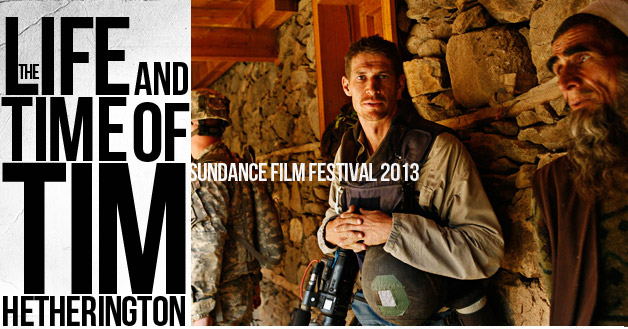
The story is in the film’s name.
Titled after a line Tim Hetherington speaks while in Misrata, Libya just hours before pro-Gaddafi forces fired a mortar that struck him and caused his untimely death in April 2011, this film is an intimate look at a harrowing time through the footage of the singular photojournalist and filmmaker. Taken from footage captured while Hetherington was staying with the rebel army during Liberia’s civil war, Hetherington unrestricted view of the conflict and the people involved is a sight audiences will not forget.
Why you want to see it: Documentaries often have a lot of pull during the festival, including Sebastian Junger and Tim Herthington’s 2010 Award winning Restrepo. Now, after Hethington’s sad passing during the Arab Spring in 2011, Junger returns to Sundance with an homage to his fallen friend and colleague.
A compassionate and loving documentary, it is also truthful in its tribute to Hetherington’s ground-breaking work and his life. As the audience learns, he was not a traditional war photographer, also also never considered himself a documentary filmmaker. Instead, Hetherington called himself an “image-maker,” a title that better enabled him to readily work across visual media, from mobile phone downloads to multimedia installations.
Trained at Cardiff School of Journalism, Media and Cultural Studies, he began his career in Liberia, Africa documenting the war and it’s impact on real people. During his time here, he also worked as an investigator and teacher.
To paint a picture of Hetherington early in his career and beyond, Junger shot candid interviews with family, including Hetherington’s girlfriend, Somali-American filmmaker Idil Ibrahim and his father, Alastair Hetherington, who recalls for the camera the premonition he had about his son going to Misrata, and how he begged him not to go.
During the festival Junger spoke about Herthington’s relationship with Libya. “When Tim got to Libya, he saw Sarajevo all over again. He saw Monrovia again,” he explains. “A moral imperative kicked in.” One of the most powerful moments of the film includes a line from Hetherington: “I risk my life both for personal reasons and for objective truth.”
Part of Junger’s motivations for making the film was to inform other journalists and the general public about the risks of war reporting, a professional that few have documented with the brutal honestly illustrated in Junger’s recent work. The director himself stopped war reporting the day Hetherington died. The somber filmmaker emphasized to a quite audience after the documentary’s screening the somber truth of the matter, that had anyone nearby had basic medical training — something according to him very few war journalists possess — Hetherington could have been saved.
This realization led Junger to create RISC (Reporters Instructed in Saving Colleagues), a non-profit organization providing freelances with the know-how to stop blood loss and clear blocked air passages. The program was started last year in New York and has already racked up a long waiting list, with plans of going global.
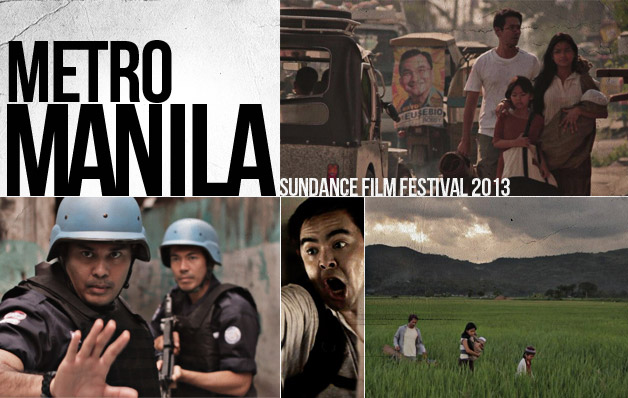
Shot entirely in the Philippines, Metro Manila by British Director Sean Ellis (Cashback), follows Oscar Ramirez (Jake Macapagal) and his family, as they struggle to move towards a better life in the city of Manila. Having explored the city while on vacation, the director chose the expressive and layered locale for his next film, along with a cast that breaks the Hollywood mould.
Why you want to see it: This the third feature by Ellis after Cashback and The Broken, he’s a veteran to the screen hot on international critics radar, not to mention a fan favourite with this year’s Sundance Audience Award in the World Cinema-Dramatic section to prove it.
The thriller opens with the Ramirez family leaving the poverty stricken rice fields of the Northern Philippine mountain ranges, and then follows them as they fight for survival in the city, eventually falling victim to manipulation of the city inhabitants culminating in a heist, portrayed in stilling climactic exhilaration.
Ellis didn’t speak the native language, but managed to deliver a carefully written film and well executed story line, with cast fine tuning authenticity. “I think it’s important to note that most language and communicating is physical,” explains the director. “The film deals with the idea of retaining honour when faced with adversity.” And this idea, we all understand, it’s a universal language as the director points out.
Inspired by his own witnessing of a armoured truck conflict, where it appeared that two guards might use their machine guns to shoot one another, Ellis began to ponder the ongoings in the metropolis.
“I was aware of Manila as a magnet for people who are below the poverty line. It’s a common cliché in Filipino TV and cinema where the downtrodden get taken advantage after moving to the big city,” says Ellis. “But it is also a reality in the Philippines too, where you are losing rice farmers to low paying city roles.”
A gripping drama that doesn’t recycle anything of the many formulaic thrillers of a similar storyline out there, Metro Manila is continuing the festival circuit with success, and we look forward to seeing it again in theatres.
Published March 29, 2013







